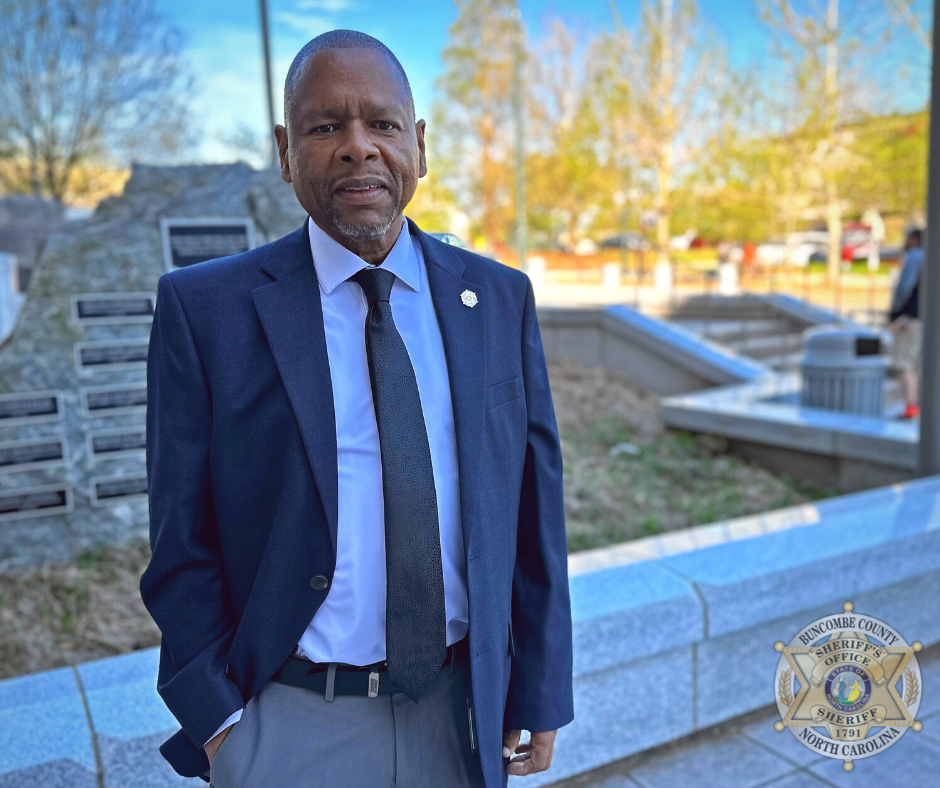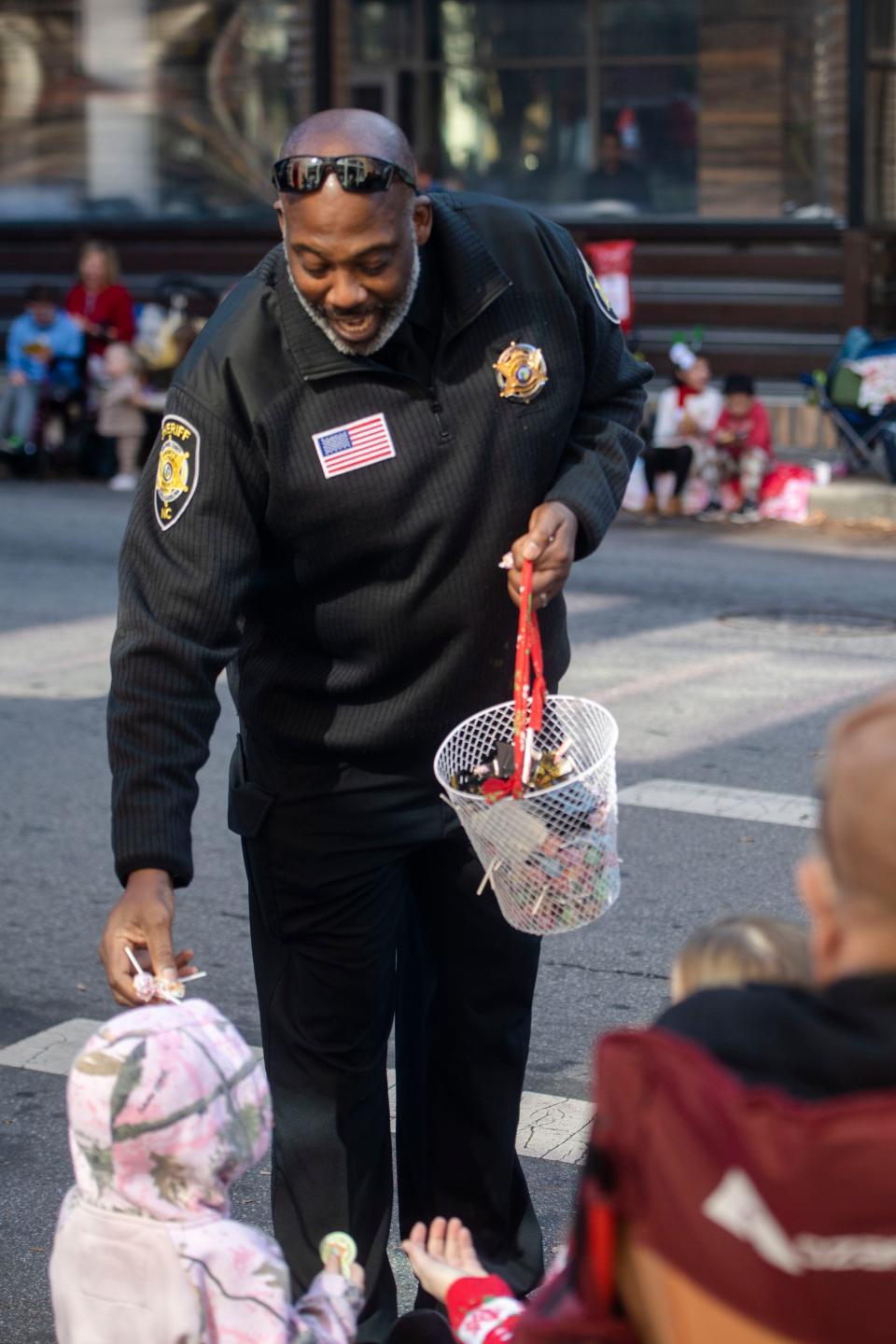Buncombe Sheriff proposes downtown patrols after restaurateurs and hoteliers ask for help
ASHEVILLE – Nearly 40 prominent Asheville restaurant, hotel and other business owners and leaders signed a letter in September sent to city and county officials requesting increased public safety presence to address largely nonviolent crimes.
The first signer on the letter, and the campaign's organizer, according to other signers, is William Dissen, owner of The Market Place Restaurant, Billy D’s Fried Chicken and Little Gem.
While the letter did not explicitly blame danger in Asheville on any particular group, multiple snippets of the letter target people experiencing homelessness.
As part of the first of five asks in the letter, the group requested officials “Fully reinstate or increase community service programs to aid in addressing crime, drug use and addiction, and removal of vagrants from public property and our city streets.”
David Nash, chair of the Homeless Initiative Advisory Committee, a group composed entirely of city and county appointees, told the Citizen Times Dec. 22 that this language is "somewhat old fashioned."
"It’s important if we’re going move people from the city streets to have a place to move them to," he said. "Those are the kind of solutions we need to all work on together."
After owners and employees of these businesses met with the Buncombe County Sheriff’s Office in November, law enforcement officials presented a report to the Buncombe County Board of Commissioners that mostly targets Asheville’s unhoused and unsheltered population.
“The Sheriff’s Office agrees with the concerned parties,” the report reads. “The environment created by (many) of the homeless are unacceptable.”
More: Debunking homelessness myths: Asheville experts take on 5 common misconceptions
Public Safety Letter Final 09-12-23 by Mitchell Black on Scribd
Representatives from the sheriff’s office delivered this 72-page report to the board of commissioners in a Dec. 5 briefing. They requested the county board allocate $186,000 for six deputies to patrol Downtown Asheville on Friday and Saturday evenings through the 2024 fiscal year. As part of that request, one law enforcement official would work in the county’s Real Time Intelligence Center.
Commissioners did not vote to grant the funding during the meeting, wanting to review the lengthy plan delivered to them at the beginning of the meeting.
Nash, former head of the Housing Authority of Asheville, who now leads the HIAC, said that the sheriff's office paused the request following the sudden resignation of former Asheville Police Department Chief David Zack Dec. 15, after three years on the job. Nash, who learned about the pause in a recent conversation with Sheriff Quentin Miller, said that Miller wants to talk about the proposal with interim APD Chief Mike Lamb. Nash said he requested to join those conversations. Miller, he said, obliged.
The Citizen Times reached out to Miller and sheriff's office spokesperson for confirmation.
A ‘co-responder’ model
The request for increased patrols is the seedling of the sheriff’s office four-phase plan to address homelessness in Buncombe County. In future phases, on a part-time basis, the sheriff’s office seeks to partner with community paramedics, mental health clinicians and various stakeholders who work with people experiencing homelessness, a "co-responder model." The county introduced this approach during the summer, and announced in the fall that it would continue on a permanent basis. Eventually, as part of that vision, Sheriff’s deputies would patrol with APD officers.
“We know we can’t arrest our way out of this,” former Hendersonville police chief and sheriff’s adviser Donnie Parks told the board. “We want to arrest where we need to. Enforcement will be a component in this process, but we realize that many of our homeless people are in need of treatment.”
“We want to be a part of that process as well to treat the overall problem.”
Interim APD Police Chief Mike Lamb told the Citizen Times that he welcomed collaboration with the sheriff’s office, lauding the co-responder model.

The sheriff’s office intends to extend its surveillance footprint by asking business owners to install cameras that will be linked to the Real Time Intelligence Center. The law enforcement official monitoring the footage would notify deputies assigned to the area if they observe any “unlawful or disruptive activity.”
In the third phase of the plan, the sheriff’s office proposed making the co-responder approach a full-time fixture. This would interrupt the “revolving door” people experiencing homelessness navigate, the report says.
“Homeless offenders who are arrested for criminal conduct and misconduct are often dismissed once the offender appears in district court,” the report says. “Most are released from involuntary detention as ‘time served.’ Once released from detention, offenders generally return to their environment and re-offend.”
The co-responder model would mark a “major paradigm shift” from an arrest-only approach, the report says.
More: Buncombe officials investigating Dec. 20 active shooter alert; history of false alarms
Bringing homelessness stakeholders together, but avoiding homelessness stakeholder discussions
In the final phase of the plan, the sheriff’s office report supported establishing a local board of representatives from the city, county and local nonprofits to respond to homelessness in the community.
It also proposes that the county convert the jail’s annex building into a place where people experiencing homelessness can seek care, treatment or assistance.
“We hope that we’ll be able to bring all the stakeholders together, try to see where we’re duplicating some services and eliminating duplication where it needs to be,” Parks said.
Those recommendations are duplications themselves, constructed in a vacuum outside of the years of collaboration and knowledge gained by county representatives, city officials and organizations that provide services for people experiencing homelessness.
More: 'A place to live': Formerly homeless Homeward Bound's Compass Point resident finds home
More: Asheville, Buncombe homelessness board will pursue new, high-access shelter
Buncombe County and the city of Asheville are already working to overhaul their homelessness response system. The HIAC is the governance board for the area’s Continuum of Care, a planning body that works together to coordinate a response to homelessness. It’s a framework overseen by the U.S. Department of Housing and Urban Development.
More: 2 new housing options for chronically homeless people coming to Asheville: What we know
In a meeting the day before the sheriff’s office presentation to the board of commissioners, county and city officials gathered to review progress made on recommendations from the National Alliance to End Homelessness, delivered to officials in January.
In response to a question from Commissioner Amanda Edwards about how this report could tie into the recommendations that county and city reviewed, Parks said that he was unfamiliar with the meeting.
Asheville’s Homeless Strategy Division Manager Emily Ball told the Citizen Times in a Dec. 20 email that HIAC did not review the sheriff’s office report. She did not see it until the Citizen Times sent it to her.
Edwards told the Citizen Times Dec. 22 that the sheriff's office and APD should work together through HIAC to determine how to address the Alliance's recommendations. She said the sheriff's office report "validated" the Alliance's findings.
More: Asheville Interim Chief Lamb talks new APD focus, 'surprise' retirement, staffing issues
Asked whether the sheriff's office and APD should send representatives to the HIAC meetings, Edwards said "of course." She added other stakeholders should attend as well.
The sheriff’s office request marks the second law enforcement initiative directed at Asheville’s unhoused population in recent months.
APD has conducted three “targeted special operations” in the past few months that mostly included low-level offenses, like second-degree trespass, panhandling and possessing drug paraphernalia. The Citizen Times previously reported that more than half of the individuals listed in the first October operation listed Homeward Bound’s A-Hope Day Center, a homeless services center, as their permanent address.
APD also initiated a 60-day "downtown safety initiative" in the spring to bring a visible police presence to Downtown Asheville. The sheriff's office began patrols in the neighborhood around the same time to "complement" APD presence.

“When we speak to the city, they say they have this under control, but that’s not the message we’re getting from the business owners and the workers who work downtown,” Miller said at the briefing.
Business owners decry inadequate public safety efforts
The business owners who signed the letter represent many of Asheville’s most high-end destinations. One business owner, however, organized the initiative, according to signers who spoke to the Citizen Times.
Dissen organized the effort to coordinate signers. He declined multiple requests by the Citizen Times to comment, saying he wanted to wait until the commission votes on the allocation.
The letter, addressed to Mayor Esther Manheimer, City Manager Debra Campbell and the Asheville City Council, but sent by Dissen in an email also to Buncombe County leaders, encourages officials to appropriate taxpayer funding to increase public safety presence.
“We need your immediate action to protect the livelihood of our workforce, neighborhoods and businesses that generate a significant tax base that provides funds for vital City services,” the letter reads.

The business owners make five requests of public officials, asking them to realign taxpayer funds for increased public safety presence. The top three requests include increased visible police presence.
“We are asking for safe, clean, and activated neighborhoods, including Downtown, for our workforce, our citizens (housed and unhoused), and our customers for the livelihood of our community and sustainability of our businesses,” reads part of the first request.
The fifth and final request is for officials to focus “resources on our citizens experiencing chronic homelessness, mental illness and/or drug addiction.”
Several business owners who signed the letter and spoke to the Citizen Times described disturbances staff or customers sometimes experience, like someone acting in a way that makes them nervous or threatened in establishments or while staff or customers walk to their cars. Some business owners mentioned break-ins or wanting assurance that law enforcement could respond quickly if they called. Others noted the need to provide support services to treat root causes for people experiencing homelessness.
"Downtown has to feel safe," said Katie Button, who co-owns Curate and La Bodega restaurants in Downtown. "When you're walking around and you come across somebody who is clearly either extremely mentally ill or on drugs, you don't feel safe because you don't know what they're going to do.”
Eric Scheffer, who owns four businesses including Vinnie’s Neighborhood Italian, which locations on Merrimon Avenue and South Asheville, and Jettie Rae’s Oyster House, said that the issue requires balancing safety, tourism and the humanity of helping people in need. At his own businesses, some of the larger chefs on his team walk staff to their cars, he said.
“The thing that we deal with most is homeless sleeping in our patios at night,” he said. “Thank God we haven’t had any vandalism and such, but we deal with and have dealt with people trying to just make our patios at Jettie Rae’s or Vinnie’s North encampments.”
Scheffer said that his team has started locking their doors, increasing lighting and asking people to leave his patios for shelters.
The group has considered hiring a private security force, which is commonplace in business districts in cities around the country, but the restaurant owners and hoteliers have not pursued that option closely.
Public Safety Reporter Ryley Ober contributed to this report.
Mitchell Black covers Buncombe County and health care for the Citizen Times. Email him at mblack@citizentimes.com or follow him on Twitter @MitchABlack. Please help support local journalism with a subscription to the Citizen Times.
This article originally appeared on Asheville Citizen Times: Asheville business owners decry safety Sheriff proposes more patrols

